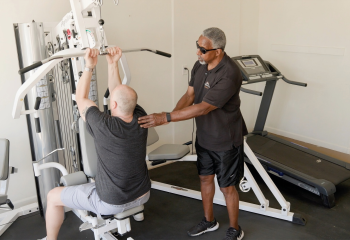More About Rehabs with Meditation & Mindfulness
People often forget that addiction affects the mind just as much as the body. While many therapies are focused on changing your behavior, meditation, and mindfulness help shift your mindset and garner motivation as you deal with the emotional aspects of recovery.
What Is Meditation/Mindfulness?
Meditation and mindfulness are tools that you can use to actively pay attention to the present moment. They are related practices that share similarities but also have differences. Meditation techniques often involve a focused attention on an “anchor” such as your breath, a mantra, a candle flame to train the mind to be in the present.
It can also sometimes be goal-oriented by helping you learn to develop self-love, cope with stress and enhance your presence in daily life. Mindfulness is a type of meditation that can be incorporated into your daily life. You can learn to bring mindful awareness to simple activities like washing the dishes, cooking dinner or going for a walk.In the practice of mindfulness and meditation, you will sit with whatever emotion you are experiencing without judging it. This process allows you to separate yourself from your mind and the negative thoughts it produces. It allows you to find peace within yourself and regulate your thoughts so you do not believe everything your mind tells you.
This act of mindfulness is essential for both sobriety and wellness. The path to recovery can at times be stressful and has the potential to cause a negative mindset. While meditation and mindfulness does not work for every person in recovery, it is worth trying if you struggle with maintaining a positive mindset about yourself or your situation while healing.
Types of Meditation and Mindfulness Techniques
Mindfulness is a word that can encompass many different techniques to help you become aware of your thoughts, accept them and intentionally show yourself compassion. Some of the most common mindfulness techniques used in rehab are:
- Meditation - This is the most classic form of mindfulness, where you learn to observe your thoughts and feelings as they arise, helping you become aware of triggers and stress responses. Meditation can be done alone in silence or guided by using an app or through the help of an instructor.
- Breathwork - Breathwork can help calm your mind and manage anxiety. Not only does breathwork help with mental stress, but can also relieve bodily tension and nervous system activation.
- Yoga - Yoga combines physical movement, breathwork and meditation into one healing practice. You can become more flexible and improve your emotional well-being through the practice of yoga.
- Visualization - Visualization is a practice of promoting relaxation and reducing stress by envisioning images or scenes within your mind to overcome your negative mindset.
- Mindful Eating - This technique involves eating slowly and paying full attention to all of your senses as you eat. This can help individuals who are struggling with an eating disorder.
Risks Associated with Meditation/Mindfulness
Meditation and mindfulness can offer many therapeutic benefits like other therapies, however there are some considerations to keep in mind before you choose to participate in mindfulness classes. Mindfulness practices can bring up strong emotions. Sometimes, allowing yourself to be still and experience your emotions can be too intense, especially during the early stages of recovery. Trained professionals at the treatment center can help you determine your level of readiness to engage in mindfulness.
Additionally, some individuals may have religious or cultural values that conflict with certain mindfulness practices. Most rehab centers will be mindful of your unique cultural background and tailor your treatment plan to reflect appropriate therapies designed just for you.
How Often Do Meditation/Mindfulness Classes Take Place?
The frequency of meditation/mindfulness classes will vary depending on your chosen treatment center. Some treatment providers will choose to prioritize these holistic therapies more than others. Some centers may offer them daily, allowing you to begin and end your day with focused attention.
Other centers may offer them several times per week or weekly, allowing you to build consistent practice, but also incorporate other important healing modalities. If you are interested in these practices, your preference of frequency will help you determine which treatment provider to choose.
How Much Does It Cost for Meditation/Mindfulness Classes?
Many rehab centers will include meditation/mindfulness classes within the price of the overall programming. This may be more common in centers specializing in integrative or holistic therapies.
Other rehab centers may offer special mindfulness-based programs for an additional fee. Depending on the center’s location, your length of stay and your insurance coverage, the cost will vary. Check-in with your insurance and the treatment center that offers meditation/mindfulness classes to confirm the price.



































































































































